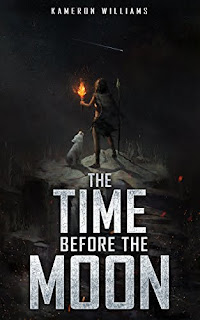Saturday, July 11, 2020
Weekly Reader: The Time Before The Moon by Kameron Williams; Prehistoric Fiction With Very Modern and Timeless Themes
Weekly Reader: The Time Before The Moon by Kameron Williams; Prehistoric Fiction With Very Modern and Timeless Themes
By Julie Sara Porter
Bookworm Reviews
Spoilers: I admit even though I usually love to read historical fiction, I was never fond of reading Prehistoric Fiction. I tried to read Clan of the Cave Bear once and found it boring. I was just never interested in reading about Neanderthal and Cro Magnons. However, I found an exception to this genre in which I was never fond. The Time Before The Moon by Kameron Williams is a prehistoric fiction that has very modern and timeless themes of conformity, group think, rebellion, and freedom.
Omi is a young villager who has come of age. He does his part participating in hunts and fights with local villagers to gain prominence and respect. Everyone does their bit and has a role to play in this village from the Quarrymen to the Hunters, to the Healers. They are ruled by The Seer, an enigmatic elderly leader who receives visions from the gods to declare laws and regulations for the village. He is surrounded by beautiful young ladies, his Priestesses who interpret his laws. If anyone disobeys they are threatened with a cleansing.
Omi acts like an obedient villager mostly. He takes part in ceremonial rites and doesn't mind much when the Seer requests sacrifices. Omi's rebellions are mostly minor. He gets into fights with the Seer's bullying grandson. He als gets high off of the joyplant with his potential love interest, Agatha. The Seer forbids ingestion of the plant as well as pairings that he did not arrange himself.
Most of Omi's rebellions are slights and harmless until he witnesses some things that cause him to question the Seer and his motives. First, he sees the Seer practically rape one of his Priestesses and realizes what their real purpose is: to service the Seer's desires. Second, even though he is in love with Agatha, The Seer arranges her marriage to his grandson to give him more power. The final straw is when Omi sees what a cleansing entails: a ritual in which the guilty party is blinded and ostracized from the village. All of these events opens Omi's eyes to the Seer's cruel and despotic nature and he runs from the Seer's autocratic ways.
The book carries a prominent theme of rebellion against conformity. When Omi leaves the village behind, he leaves the aunt and uncle who raised him, the woman he loves, and his closest friends some who follow the Seer's commands to find him. The price of his rebellion is complete ostracism with only a Wolf pup, called originally Pup, as a companion. In this distant time when community meant survival and the elements and animal life are so uncertain that being outside could kill you. When only a community can protect you, that is a huge price and it is one that Omi is willing to bear. That is how he much he distrusts the Seer and knows that he has become a dictator.
Freedom becomes important to Omi and his leaving causes a ripple that grows larger within the community as other villagers are clued into the Seer's tyranny and begin to abandon the village. Just like in modern times, one person questioning the system creates a chain of others who begin to see the errors as well. It isn't before too long that Omi has his own community of outcasts.
There is also a theme of exhibiting true leadership. Omi must ensure that his village is not run like the old one nor that he becomes like the Seer. He wants his village to carry on the ideas of freedom and live beyond the rules set by the Seer. He strives to make his village a more democratic peaceful place and to show mercy and charity, even in one particular surprisingly heartwarming moment, to his enemies.
The Time Before The Moon may take place in prehistory, but we can see these themes echo throughout not only history but in modern times as well.
Subscribe to:
Post Comments (Atom)

No comments:
Post a Comment